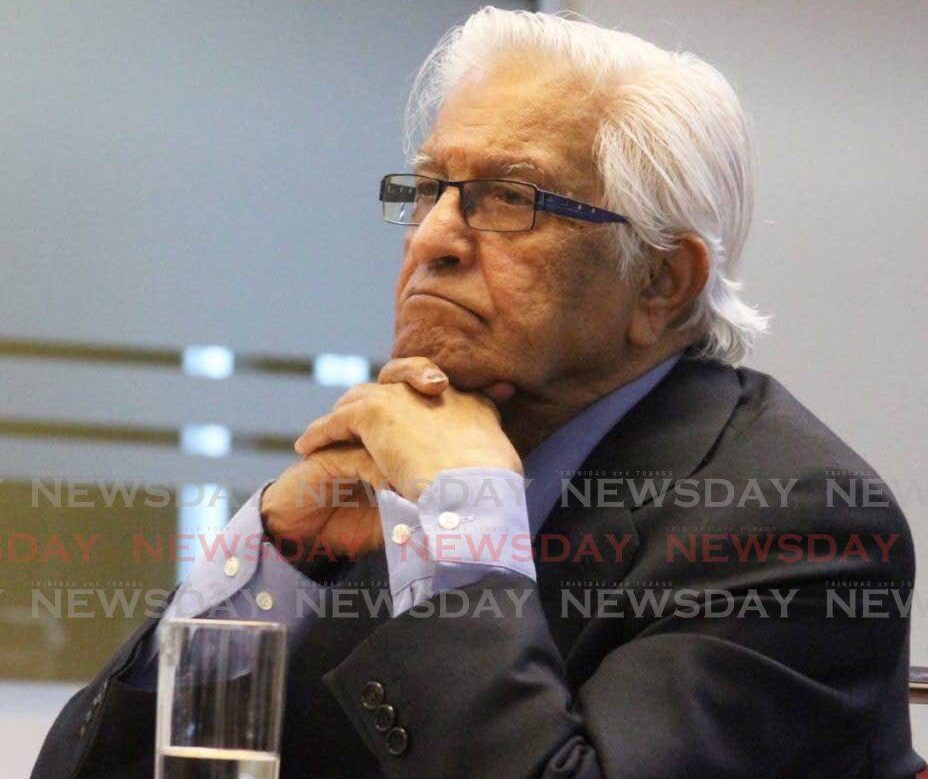Journalists: 'Panday saw importance of media in politics'

Current and former media practitioners say Basdeo Panday had a tumultuous relationship with the media, especially when he was Prime Minister but, as an individual, he remained personable.
Panday, the country’s fifth PM, who served from 1995-2001, died on Monday.
Sunity Maharaj, Independent Senator, former journalist and managing director of the Lloyd Best Institute of the West Indies said TT mourned the passing of a leader who stirred the passions of sugar workers and held out the hope of bridging the divides between people.
As president of the Media Association of TT (MATT) in the early part of Panday’s tenure as PM, Maharaj said as a labour and political leader with a base in south-central Trinidad, when he took office in 1995 there was a real opportunity for engaging a transformational process but he missed it.
“As with so much else, Basdeo Panday’s relationship with the media was mercurial. One minute he would be on a platform denouncing the media and calling for a boycott; the other he would be fielding interviews and chuckling with journalists.
“He was never one to duck the media. As a master of the quip, wit and verbal whip, he had the confidence to handle any question, whether or not he actually answered it.
“The confrontation that developed between the media and PM Panday early in his administration remains a period for investigation, clinical research and analysis. As the then president of the MATT and a staffer at the Trinidad Guardian, which was in the eye of that storm, I’ve had many years to review the quite mysterious trajectory of that particular episode in the nation’s life. However, that discussion is for another day and time.”
In 1996, the Guardian ran a photo of Panday with a drink and the headline "Chutney Rising" on the front page. His response was to call for a boycott of the paper, barring Guardian reporters from accessing government information, and calling on then editor-in-chief Jones P Madeira to be fired.
The next year, the government published a green paper called Reform of Media Law – Towards a Free and Responsible Media. Part of the bill called for a High Court judge to be given the power to hear complaints about civil wrongs committed by the media and to punish those who disobeyed the judge’s orders.
Many media personnel criticised the green paper and there was even a large demonstration in Port of Spain against it. The bill lapsed in October 2001.
Maxie Cuffie, former MATT president and former minister of Public Administration and Communications said he was from Caroni and his father was a cane farmer so he understood Panday’s struggles, where he came from and where he wanted to go.
As a result, he personally had an excellent relationship with Panday and they would message each other on WhatsApp on occasion.
Cuffie told Newsday as president of MATT during the height of the green paper on the media, he requested a meeting with Panday to discuss his relationship with the media. Panday agreed to meet with the association almost immediately.
“I think Mr Panday recognised the importance of the media to the political process. We (media personnel at the time) changed the information environment and there were political consequences to that. He recognised the change in the media as being crucial but he didn’t have the expertise to treat with the change.
“So he went to his political instincts first and his instincts were those of a fighter – he fought for workers as a trade unionist, he fought for the rights of his supporters, he fought as a member of the opposition. But that never affected his personal relationship with members of the media, especially with me. We were always respectful and friendly to each other.”
He also recalled being part of the delegation from The Independent newspaper that went to India with Panday. He said Panday made arrangements for members of the media and treated them well throughout the process.
Cuffie added that, as a dog-owner he respected Panday’s relationship with his dog Norman and knew Norman would be grieving the loss of his master. He also sent his condolences to the Panday family.
Dale Enoch, interim MATT president, added that Panday had a love/hate relationship with the media while he was prime minister, which was a drastic change from when he was a trade unionist and member of the opposition.
“Once you were part of the media, or even an observer, you would remember he didn’t have a smooth relationship with the media. He was charming when he wanted to be but it was anything but a smooth relationship.
“I remember Mr Panday giving the media a tongue-lashing from time to time during that period. So much so it got to the point we had to stage a massive demonstration where members of the public joined, just to protect the rights of the media.”
Enoch said Panday tried to be respectful to members of the media “from time to time” but that did not always work out. He recalled one time at a political rally in 1998 when Panday told his supporters to “treat (the media) as political opponents who are out to destroy us.” Several reporters covering the event were assaulted.
In 2020, he also refused to sign the Declaration of Chapultepec, which affirmed the basic principles of press freedom saying that no law or act of government may limit freedom of expression or of the press.
Enoch said Panday “gave the media a challenge” and that Panday would be remembered by those and other situations during those periods.
Enoch extended his condolences to Panday’s family.


Comments
"Journalists: ‘Panday saw importance of media in politics’"